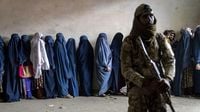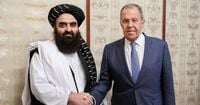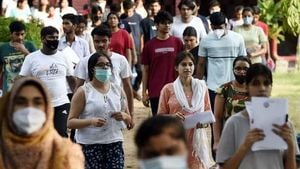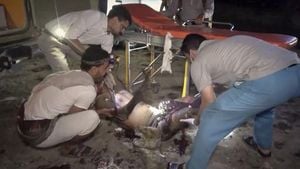In a significant diplomatic shift, Russia's Supreme Court has lifted its ban on the Taliban, a group it had designated as a terrorist organization for over two decades. The ruling, announced on April 17, 2025, follows a request from the Prosecutor General's Office and is effective immediately, according to the state news agency Tass. This decision marks a pivotal moment in Russia's approach to the Taliban, particularly since the group seized power in Afghanistan in August 2021 during the chaotic withdrawal of U.S. and NATO forces.
The Taliban had been officially listed as a terrorist organization in 2003, making any contact with its members punishable by law. However, in recent years, Russia has gradually engaged with the Taliban, hosting delegations and discussing security cooperation, particularly in countering the Islamic State's regional affiliate, ISKP. President Vladimir Putin previously referred to the Taliban as an “ally” in the fight against terrorism, indicating a shift in Russia's stance.
Foreign Minister Sergey Lavrov emphasized in October 2024 that Moscow aims to enhance political, trade, and economic ties with Afghanistan. The lifting of the ban is seen as a step toward recognizing the Taliban's government, although it does not equate to full diplomatic recognition. Some analysts view this move as a response to Russia's growing concerns over regional security, particularly regarding the activities of ISKP, which has been responsible for several high-profile attacks in the region.
Russia's decision aligns with similar actions taken by Central Asian neighbors. Kazakhstan and Kyrgyzstan have also removed the Taliban from their lists of terrorist organizations, reflecting a broader trend of engagement with the group. Despite the Taliban's strict governance and human rights abuses, including bans on girls' education and severe restrictions on women's rights, these countries are prioritizing stability and security in their dealings.
As part of its efforts to normalize relations, Russia has maintained its embassy in Kabul, unlike many Western nations that have withdrawn their diplomatic presence. The Taliban's return to power has been met with international skepticism, particularly concerning its human rights record. The group's initial promises of a more moderate rule have been overshadowed by ongoing restrictions on women and girls, leading to widespread condemnation from the international community.
Despite these challenges, the Taliban has sought to establish diplomatic ties with various countries, including China and the United Arab Emirates, and has recently appointed an ambassador to Beijing. The ongoing dialogue with Russia is viewed as part of a strategic effort to gain legitimacy and secure international recognition.
In a related context, Moldova's parliament voted on April 17, 2025, to hold parliamentary elections on September 28. This decision comes amid a backdrop of political tension and public protests against corruption and government accountability in the country. President Maia Sandu's pro-European party faces a formidable challenge from a coalition led by former prosecutor-general Alexandr Stoianoglo, who advocates for improved ties with Russia.
Meanwhile, in Ukraine, the government has approved the dismissal of the military governor of the Sumy region following a deadly Russian missile strike that killed 35 people, including children. The attack, which occurred during an award ceremony for local soldiers, has sparked outrage and calls for accountability within the Ukrainian government.
In other international developments, Iranian Supreme Leader Ayatollah Ali Khamenei has expressed cautious support for ongoing nuclear discussions with the United States, asserting that while Iran is open to addressing U.S. concerns, it will not negotiate its uranium enrichment program. This statement comes ahead of a second round of talks aimed at addressing Iran's nuclear activities.
On the European front, the EU is set to tighten its visa suspension mechanisms, making it easier to revoke visa-free travel for countries that abuse the system. This change reflects the bloc's commitment to combat illegal migration and uphold human rights standards.
As the geopolitical landscape continues to evolve, the recent developments regarding Russia and the Taliban highlight the complexities of international relations in a rapidly changing world. The implications of these shifts will resonate across Central Asia and beyond, as nations navigate their interests amid ongoing security concerns and humanitarian crises.






